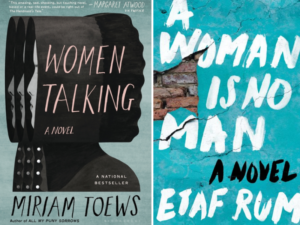
Female Rebellion Challenges Patriarchy in Two New Novels
 “Revolutions don’t come from a place of happiness,” writes Etaf Rum, in her debut novel, A Woman is No Man. The narrative flips between two, sometimes more, perspectives—Isra, a Palestinian woman who leaves her home in the early 1990s to marry Adam, a man she has met only once, and move to Bay Ridge, Brooklyn, and Deya, Isra’s oldest daughter, navigating through her senior year of high school in 2008, while trying to convince her grandparents that she should be able to go to college instead of getting married. It’s a story of insularity, brutality—and the redemption that can come from women’s quiet revolutions.
“Revolutions don’t come from a place of happiness,” writes Etaf Rum, in her debut novel, A Woman is No Man. The narrative flips between two, sometimes more, perspectives—Isra, a Palestinian woman who leaves her home in the early 1990s to marry Adam, a man she has met only once, and move to Bay Ridge, Brooklyn, and Deya, Isra’s oldest daughter, navigating through her senior year of high school in 2008, while trying to convince her grandparents that she should be able to go to college instead of getting married. It’s a story of insularity, brutality—and the redemption that can come from women’s quiet revolutions.
Women Talking is the latest novel from Canadian author Miriam Toews (an actual Canadian informed me that it’s pronounced TAYVZ), about a group of women discussing what action to take after coming to the realization that they, as well as their daughters, have been raped by men living alongside them in Molotschna, their isolated Mennonite community somewhere in South America. August Epp, a young man who has recently re-entered the community after his parents were excommunicated, is the notetaker for the women, who can neither read nor write. The novel chronicles the decision-making process (the options are Do Nothing, Stay and Fight, or Leave), and the conversation grows steadily tenser when the women learn that one of the rapists is returning to the community.
It’s easy to draw lines between these novels and the current state of affairs in the world—there’s even a “not all men” moment in Women Talking. These are books about patriarchy, religious and cultural, and how women suffer while the boot is on their throats. Naturally, both these books are attracting major attention in 2019—especially from female readers and critics—as abortion bans and #MeToo stories sweep the country. It’s important to acknowledge how frankly the writers address patriarchy:



